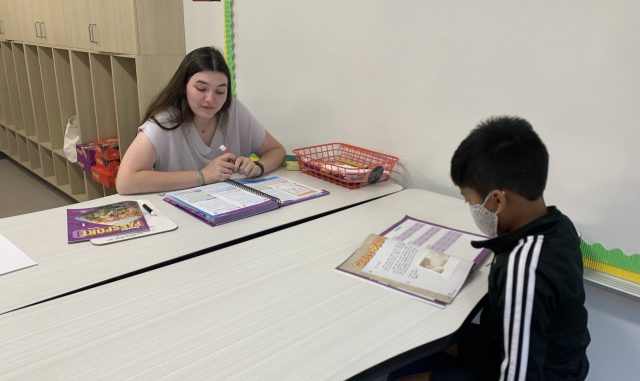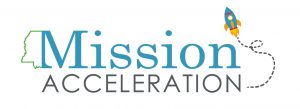
A Mission Acceleration tutor (left) works with an Oxford elementary school student during the summer. Mission Acceleration, based at the School of Education, aims to get 250 college students to work as tutors to help get 1,000 Mississippi students’ reading up to grade level. Submitted photo
OXFORD, Miss. – The University of Mississippi‘s Mission Acceleration pilot program aims to get 1,000 of the state’s youngest students reading at grade level through intensive tutoring to fight learning loss caused by time away from classrooms during the COVID-19 pandemic.
Mission Acceleration works through high-dosage tutoring, evidence-based reading interventions, a vast digital library, and meaningful academic and social connections with a role model. The aim is to send 250 of Mississippi’s best and brightest college students to serve as tutors, known in the program as “academic guides,” to K-5 students in seven pilot communities.
The intensive program will span four academic semesters, operating through summer 2022. The program officially launched in June and is off to a good start, said Ashley Sheils, director of the initiative.
“We were fortunate to have 26 academic guides this summer and about 150 K-5 students,” Sheils said. “We want to enlist 250 guides to reach 1,000 children.
“We obviously know the pandemic has caused challenges for students. We are trying to address the deficits related to reading proficiency, and college students are more than capable to help us meet this goal.”
Applications are being accepted here. College students who would like to participate this fall must be on board by Sept. 1 to receive the necessary training and complete onboarding protocols. Recruitment for the spring session is ongoing, Sheils said.
Mission Acceleration aims to train more skilled reading tutors in Mississippi, as well to increase the total number of minutes struggling readers spend on appropriate, “Lexile-leveled” text as one of its methods. The program also provides resources for parents to support reading development at home.
Heading into the pandemic, Mississippi had made much progress on literacy issues. The New York Times reported that in 2019, Mississippi’s fourth graders posted the nation’s best reading scores, and all their grades were at least on the national average, according to the National Assessment and Educational Progress, or NAEP, scores. The NAEP score is often called “The Nation’s Report Card.”
 The work of Mission Acceleration is housed within the Center for Excellence in Literacy Instruction, or CELI, part of the UM School of Education. The center’s aim is to “provide exemplary instruction, relevant research and effective service through collaboration with schools, businesses, community organizations and the public at large.”
The work of Mission Acceleration is housed within the Center for Excellence in Literacy Instruction, or CELI, part of the UM School of Education. The center’s aim is to “provide exemplary instruction, relevant research and effective service through collaboration with schools, businesses, community organizations and the public at large.”
Mission Acceleration’s work is critical to maintaining literacy progress in Mississippi, such as the NAEP scores posted in 2019, said Angela Rutherford, professor of teacher education and CELI director.
“We have kids who have unfinished learning because of lost classroom time,” Rutherford said. “We accelerate learning to address this unfinished learning. It’s no one’s fault; it is the reality of the pandemic.”
“Utilizing college students who want to make a difference in our communities as a way to support these K-5 students – all of it is interconnected to help improve literacy.”
There is also a social justice aspect to any literacy-related work, Rutherford said.
“Ultimately reading is the key,” she said. “It is the social justice issue. If you cannot read, the likelihood that you graduate from high school, or you have a productive career or some way take care of yourself and your family substantially decreases.”
A nice bonus of the program is that besides helping transform students’ lives, it strengthens and diversifies Mississippi’s teaching pool. Sheils said she also expects the program to continue to improve after having had a summer under its belt. The early data from the first summer looks promising, too, she said.
“Preliminary data shows that we helped the students avoid a ‘summer slide’ in their reading ability, and met our goal of accelerating reading growth with a few students showing gains of more than 20 percentile points on the Star Reading assessment,” Sheils said. “This equates to about four months of reading growth in seven weeks.”
“As with any new program, lessons were learned and improvements will be made. Helping children become better readers will always be our top priority.”